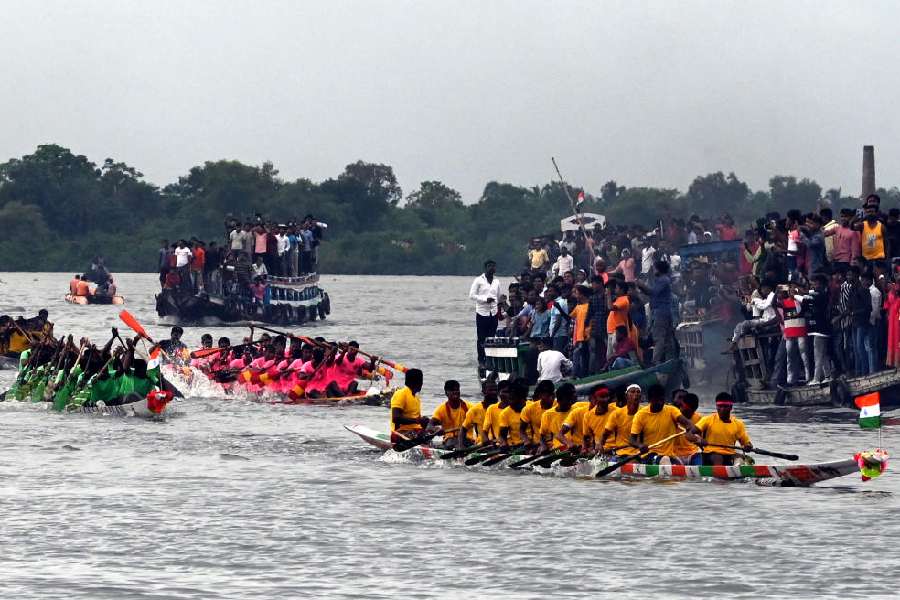A village fair to celebrate the back-to-back festivals of Vishwakarma Puja and Ma Mansa Puja had a high point: a boat race.
The “Nouka Baich Pratiyagita” was held at Ghushighata in Kulti, about 50km from Calcutta, on September 19. On the Bidyadhari river, eight baich or boats with 22 crew members on each fought for prizes in best-of-three races.
The Bidyadhari, normally a thin ribbon of brackish water carrying the city’s waste, was a swollen river on Tuesday after monsoon showers. Sarki nouka or the racing boats, each 52 arms in length (78 feet with one arm length being 1.5 feet) and about 3.5 feet in width were tethered to the banks prior to the race with the crew members resting in the tow boats after a light meal of potato and prawn curry.
Pre-race preparations were on. The cheerleaders of the teams were prepping the boats for the race that was to start at 3pm. The stern was oiled so that there would be less friction. The ojhas (quacks) from nearby villages were called to dispel ill luck and ensure success.
Haripada Majhi from Dongajora village of Kultali, South 24-Parganas, has 21 members in his team whom he has handpicked and trained since he started competing in boat races in 2018.
Boat owner Abbas Sheikh, also from the same village, had got the boat made by a mistri (workman) from Bongaon (North 24-Parganas) for Rs 2.5 lakh. The boat has raced in 15-20 races, said Sheikh.
“We win four out of five races that we participate in a year,” said Abbas with cool confidence.
“The majhi or the helmsman steers the race and is the main player in the team. The rest are paddlers. The majhi places himself in the boat according to the current in the river. Sometimes, he may be on the right, sometimes on the left. The crew sets a rhythm which determines the pace at which the boat will move and all the paddlers follow the rhythm,” said Swarup Bhattacharya, a social
anthropologist who specialises in the rural boats of Bengal.
At Ghushighata on Tuesday, there were eight boats competing from neighbouring villages, Andharia village on the west bank of the Piyali river and Dongajora village on the east bank. “We are from neighbouring villages but when it comes to boat racing, we are rivals,” said Abbas.
They practise in the Matla river only during the monsoon, just before the racing season begins. “The Matla has a lot of waves, we cannot have races there,” said Abbas.
The members of the team are a mix of Hindus, Muslims and tribals.
Baburam Sardar is an Oraon who took leave from his contractor in Bangalore to race at Ghusihgata.
After a lot of fanfare, the race started around 4pm. The team from Dongajora in yellow shirts won the first race hands down. Thereafter, passenger boats, carrying Manasa idols for immersion, flooded the
river and cut off some of the racing boats.
Dongajora complained to the organisers and pulled out from the race. One
could hear the organiser pleading: “Please don’t leave the race. Our villagers will be very sorry to see you leave. We will cut into pieces anyone who gets in your way.”
That’s a village boat race for you.
The boat from Andharia village in Kultali finally won the race at Ghushighata amid pullouts by two boats from the neighbouring village Dongajora.
